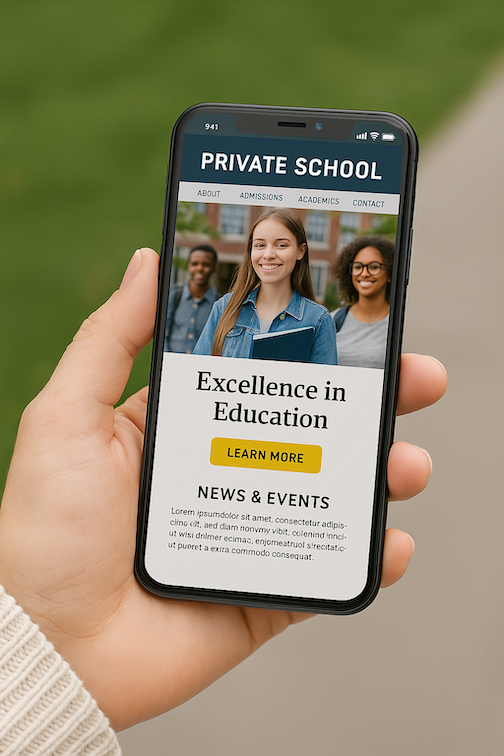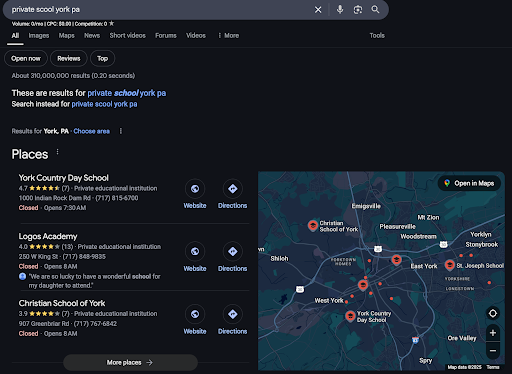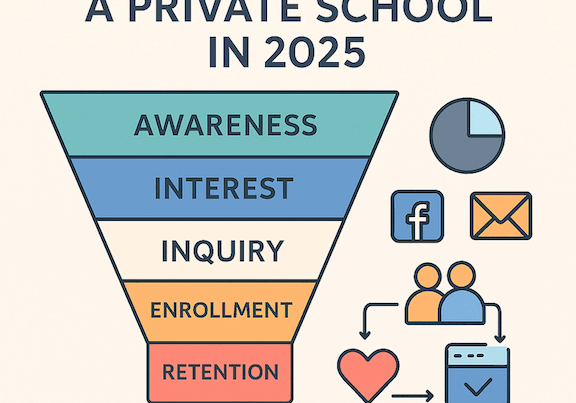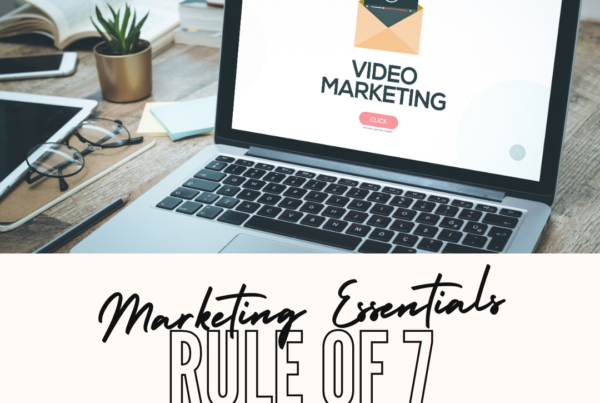To boost enrollment in your private school, you need effective private school marketing ideas. This article will guide you through a comprehensive marketing strategy, from omnichannel marketing to optimizing your school website. You’ll discover practical tips to enhance your school’s visibility and reputation, helping you attract more families.
Key Takeaways
- Omnichannel marketing is essential for private schools, integrating multiple platforms to enhance visibility and foster trust among prospective families.
- Understanding and defining the target audience is crucial; tailoring messaging to family demographics allows for more effective marketing strategies.
- Developing a strong school brand and optimizing digital presence, including local SEO and website design, significantly impacts enrollment and community engagement.
Why Private Schools Must Invest in Omnichannel Marketing
The days of private schools relying on traditional marketing methods like open houses or newspaper ads are over. Single modality marketing is no longer effective and private schools need to pivot to more holistic and connected strategies. Omnichannel marketing is the answer, so your school’s presence is across multiple platforms. Having consistency across these channels isn’t just nice, it’s critical for building trust and familiarity and retaining your school’s ethos with prospective families.
Consider this example:
At VujaDay we’re currently working with a K-2 private school in suburban Pennsylvania who has consistently struggled with declining enrollment. In 2023, they implemented an omnichannel marketing strategy that included targeted Google Ads, monthly blog posts answering common parent questions, consistent Instagram and Facebook updates, and a revamped email campaign for prospective families. Within 12 months, this private school increased website inquiries by 47%, boosted open house attendance by 32%, and filled all available kindergarten seats for the first time in five years. Their cohesive messaging across platforms not only improved brand trust but also positioned them as a top choice in their local market.
Omnichannel marketing is more than just a buzzword – it’s essential for private schools to succeed in today’s digital world. Unifying all promotional channels presents a clear and compelling story about your school that stays top of mind with prospective parents as they evaluate options.
Subsequent sections will explore detailed strategies useful in crafting a comprehensive omnichannel marketing agenda for your school.
Define Your Target Audience
Grasping who your target audience is forms the cornerstone of a formidable marketing strategy. For private schools, knowing who your target audience is is the foundation of a good marketing strategy.
Ultimately, this means digging into the demographics and psychographics of the families your schools want to enroll. In-depth market research allows schools to pinpoint what prospective families value and expect. This gives you the ability to craft messages and outreach that speaks to their needs and desires.
Marketing approaches need to differ by age brackets, for example, strategies for K-5 won’t work for high schoolers. And profiling parent types – like those prioritizing career advancement or newbies to private schooling – helps shape tactics that speak to parents.
Defining your target audience and deploying multiple marketing strategies are key to making your marketing efforts purposeful and effective.
Optimize Your School Website
A well designed school website is key to grabbing and keeping visitors’ attention which impacts decisions around enrollment and student experience during the admissions journey.
Key characteristics that every school’s online portal should encompass are:
- A professional look and feel
- Fast loading times
- Mobile optimization
- Simple navigation
The likelihood of users leaving a website increases if it is not properly optimized for use on mobile devices, thus making such optimization a vital part of your digital strategy.
Websites that load fast keep visitors engaged as most expect a page to load within two seconds. Search engine optimization (SEO) is important for search rankings, building brand trust and attracting specific audience segments. Private schools investing in SEO can enjoy its advantages with minimal upkeep over many years.
By optimizing your school’s online presence you create an attractive online profile that pulls in prospective students and keeps them engaged. This serves to boost not only how your school is perceived, meanwhile meets the institution’s targets for new student enrollment by making it easier for families researching admission into your school.
Local SEO – Be the First School They See on Google
Local SEO is a key strategy to make your school visible in search results when families are looking for education options near them. To maximise visibility in the Google Maps Pack you need to have a complete and up to date Google Business Profile (GBP). This means uploading images, accumulating reviews and posting news about your school.
Having an up to date GBP not only makes you more visible on Google but also builds trust with potential families by highlighting what sets your school apart and sharing positive feedback about it. At VujaDay, we’ve seen this firsthand with York Country Day School. After optimizing their GBP and implementing a targeted local SEO strategy, they’re now ranking #1 in the Google Maps Pack for key searches in their area—helping them stand out to prospective families right when it matters most.
Prioritizing local SEO helps draw in local community members to your school, so your school is the first they see on Google.
Google Ads Get Discovered When Families Are Actively Searching
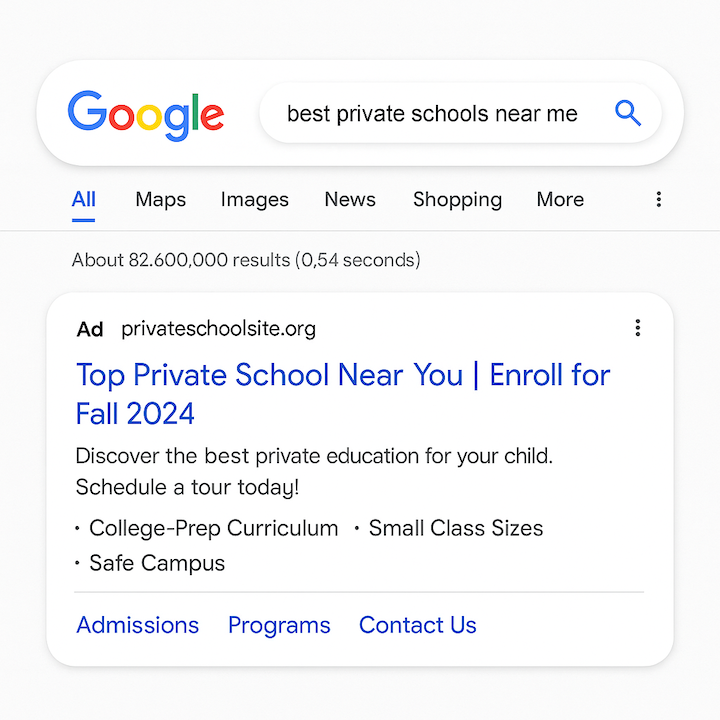
Running targeted pay-per-click (PPC) ads allows your school to appear at the top of search results when families are searching for terms like “best private schools near me” or “private Catholic schools in [City].” These ads capture families who are already showing high intent — making them more likely to inquire or schedule a tour.
When used together with local SEO, content marketing, and social media, Google Ads amplify your school’s visibility at every stage of the parent decision journey.
Here’s how to integrate Google Ads into your omnichannel strategy:
- Target local ZIP codes aligned with your ideal audience demographics=
- Highlight your school’s differentiators (such as specialized programs, small class sizes, or campus safety) in ad copy to reinforce messaging parents may see on your website or social media
- Use ad extensions (sitelinks, callouts, click-to-call) to create multiple touchpoints from a single search result
Running Google Ads ensures families not only see your school organically but also encounter your brand in paid placements — strengthening familiarity and trust across channels.
Pro Tip:
Use consistent messaging across your ads, website, and social media so families experience a seamless journey no matter where they first encounter your school.
Tracking key metrics like cost-per-inquiry, click-through rate (CTR), and inquiry-to-enrollment conversions will help refine your omnichannel campaigns over time — making your marketing smarter, more efficient, and more effective.
Content Strategy – Build Trust by Answering Parent Questions
Developing a carefully crafted content strategy is crucial for gaining the trust of prospective parents. By producing content that addresses frequently asked questions, your school can establish itself as an authority on the subject. Content could take various forms such as in-depth blog articles, captivating videos, and extensive FAQ sections.
Not only does this type of content boost your SEO rankings, but it also amplifies the effectiveness of your email marketing initiatives by delivering valuable insights to potential parents. Catering to parent expectations and demonstrating your knowledge fosters confidence and draws additional interested families toward your educational institution’s marketing efforts within the education sector.
Social Media – Build Awareness and Connection
Using social media effectively is one of the most powerful private school marketing ideas for building community, showcasing your school’s culture, and boosting enrollment.
By sharing highlights of daily experiences, celebrating student achievements, and promoting events across social platforms like Facebook, Instagram, and LinkedIn, your school can create a vibrant and authentic online presence.
Grasping the difference between organic social media and paid social ads is essential to building a comprehensive, omnichannel marketing strategy.
Organic Social Media – Build a Genuine, Engaged Community
Organic social media focuses on growing your audience naturally by consistently sharing meaningful content. Key strategies include:
- Posting photos and videos from daily school life, sports, arts, and service activities
- Highlighting student and staff achievements
- Sharing behind-the-scenes stories and testimonials
- Using community-focused hashtags and tagging local businesses or organizations
Organic social builds trust over time, offering parents and prospective families a window into your school’s community and culture — without the pressure of direct advertising.
Paid Social Ads
While organic growth is vital, paid social media ads allow you to reach families who may not already know about your school. Paid ads provide targeting options based on location, interests, family demographics, and more — ensuring your messaging reaches the most likely prospects.
Employing targeted ads on social media is crucial when aiming to connect with parents searching the internet for educational opportunities. Incorporating compelling imagery and video content into these marketing activities can greatly bolster your school’s marketing activities.
Key paid strategies include:
- Running location-specific ads to attract families in nearby ZIP codes
- Using compelling imagery and video to showcase your campus and programs
- Launching retargeting campaigns to re-engage families who visited your website but didn’t inquire or schedule a tour
Paid social ads help fill the top of your enrollment funnel quickly and efficiently, supporting broader omnichannel efforts like content marketing and Google Ads.
Combining Organic and Paid Social for Maximum Impact
The real power of social media comes from combining organic engagement with strategic paid promotions.
When prospective families see consistent, authentic content and sponsored posts reinforcing your brand’s strengths, it builds a layered trust pathway — moving them steadily from awareness to inquiry to enrollment.
An integrated approach ensures:
- Higher visibility in crowded social feeds
- Reinforced messaging across multiple touchpoints
- Increased trust through genuine community interaction plus professional branding
By blending organic storytelling with paid targeting, private schools can create a full-funnel social media strategy that drives real enrollment results — and strengthens the entire omnichannel marketing system.
Build Personal Connections Through Email Marketing
Email marketing is a key way to build personal relationships with potential families. By sending newsletters, invites to school events and regular updates you can keep these families informed and engaged.
The goal of email marketing campaigns is to share key information about what your school offers to generate leads and increase student enrollment. By using automated email workflows the communication with prospective families becomes more streamlined and timely—guaranteeing relevant and consistent interactions. Furthermore, segmenting email lists allows for targeted messaging to specific audience segments—boosting the impact of your tailored email campaigns. Finally, crafting great subject lines for emails is also an important tactic in outreach
Email marketing plays a big role in engaging parents during the student enrollment stage. As such it’s a key part of any strategy to increase those numbers.
How an Omnichannel Strategy Brings It All Together
Implementing an omnichannel marketing strategy is where all of these private school marketing ideas connect into a powerful, results-driven system.
Each piece — Google Ads, local SEO, content marketing, and social media — plays a critical role:
- Google Ads ensure your school appears first when families are actively searching.
- Local SEO builds credibility by helping your school dominate the Google Maps pack.
- Content marketing nurtures trust by answering the key questions parents are asking.
- Organic and paid social media foster emotional connections, keeping your school top of mind throughout the decision-making process.
When all channels work together seamlessly, prospective families encounter consistent messaging and a cohesive brand experience — no matter where they engage with your school first. This layered visibility builds familiarity, trust, and ultimately drives more inquiries, campus visits, and enrollments.
To maximize the impact of your omnichannel strategy:
- Personalize your messaging based on the needs and interests of your audience.
- Use data and tracking tools to refine campaigns over time and deliver content families care about most.
- Visualize your funnel (e.g., using a simple infographic) to show how awareness leads to engagement, which leads to enrollment.
By strategically combining these private school marketing ideas, schools can create a seamless journey for families — one that not only attracts new students but also strengthens retention and reputation for years to come.
Ready to Grow Your Enrollment? Start Your Omnichannel Strategy Today
At VujaDay Digital Creative, we help private schools implement results-driven omnichannel marketing strategies that build trust, boost visibility, and increase enrollment. If you’re ready to align your message across every platform and attract more of the right families, book a free consultation with our team today. We’ll help you turn proven marketing ideas into a powerful system that supports long-term growth.
Frequently Asked Questions
Why is omnichannel marketing important for private schools?
Employing omnichannel marketing is essential for private schools, as it ensures that their communication remains uniform across different channels. This increases the school’s presence and builds credibility among families considering enrollment.
How can private schools define their target audience?
Thorough market research and creating detailed profiles of parent personas, private schools can pinpoint their ideal target audience. This strategy enables these educational institutions to customize their communication and engagement strategies more effectively.
What are the essential features of a well-designed school website?
A well-designed school website must have a professional image, fast loading times, mobile responsiveness, and easy navigation to effectively engage visitors.
Ensuring these features will significantly enhance user experience and retention.
How can local SEO benefit private schools?
Local SEO greatly improves the presence of private schools in search results, making it more convenient for families to find details about educational choices.
What role does email marketing play in private school marketing strategies?
Marketing strategies for private schools rely heavily on email marketing to cultivate relationships with potential families, provide them with important details, and ultimately boost enrollment initiatives.


